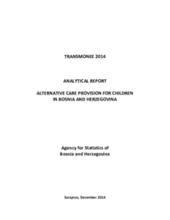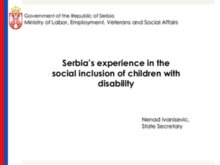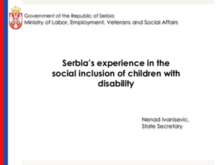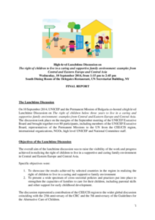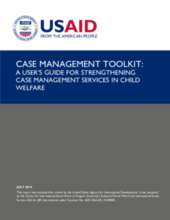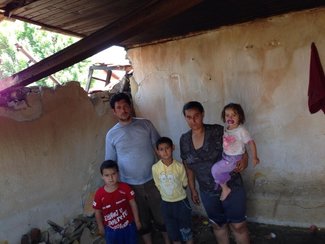

Displaying 431 - 440 of 544
This document reports on an Institutional Learning Process that has critically analysed the impact and effectiveness of Terre des hommes’ (Tdh) engagement in Albania over the last 14 years. It looks at the role Tdh has played in the emergence of a State Child Protection System (CPS) in Albania.
This document from the Agency for Statistics of Bosnia and Herzegovina provides an overview and assessment of the alternative care system in the country.
On 10 September 2014, UNICEF and the Permanent Mission of Bulgaria co-hosted a high level Lunchtime Discussion on the right of children below three years to live in a caring and supportive family environment: examples from Central and Eastern Europe and Central Asia. Serbia focused its presentation on the support provided to families of children with disabilities and the importance of investing in family-support services at municipal level.
On 10 September 2014, UNICEF and the Permanent Mission of Bulgaria co-hosted a high level Lunchtime Discussion on The right of children below three years to live in a caring and supportive family environment: examples from Central and Eastern Europe and Central Asia. Serbia focused its presentation "Serbia’s Experience in the Social Inclusion of Children with Disability" on the support provided to families of children with disabilities and the importance of investing in family-support services at municipal level.
On 10 September 2014, UNICEF and the Permanent Mission of Bulgaria co-hosted a high level Lunchtime Discussion on The right of children below three years to live in a caring and supportive family environment: examples from Central and Eastern Europe and Central Asia.
The theme of “Ensuring the Rights of the Child, and Family-based Services” chosen for the IFCO 2014 European Conference invites workshop ideas, plenary topics and attendees who envision foster care, and indeed, all alternative care as the holistic system that IFCO promotes.
UNICEF Albania office wishes to invite applicants to submit a proposal for conducting an “Analysis of National Child Protection Systems in the Wider Context of the Social Protection System in Albania.”
The One Step Forward book is a visual guide to resilience, written and illustrated by young people in foster care.
In this chapter of the Handbook of Child Well-Being, the authors review the findings from research on the cognitive and social-emotional development of children growing up in institutions, foster care and adoption.
The toolkit provides the user with a comprehensive assessment framework for analyzing current systems, procedures, and practices against international standards and professional case management practices at both the case level and system level. This toolkit does not promote a specific model of case management since no one approach or model can be applied to every situation. Rather, it outlines the beneficial aspects, processes, and strategies of case management that have shown improved outcomes for children and families.


